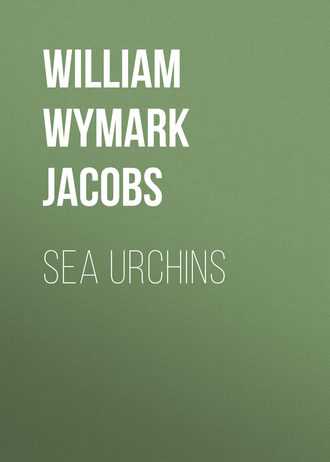 полная версия
полная версияSea Urchins
“Now, girls,” said Miss Evans.
“Put those things down,” said the skipper in a peremptory voice.
“Sha’n’t,” said Miss Evans bluntly. “You haven’t got enough on yours,” she said, turning to Miss Davies. “Don’t spoil the skipper for a ha’porth of tar.”
At this new version of an old saw they laughed joyously, and with mops dripping tar and paint on the deck, marched in military style up to the skipper, and halted in front of him, smiling wickedly.
Then the heart of the skipper waxed sore faint within him, and, with a wild yell, he summoned his trusty crew to his side.
The crew came on deck slowly, and casting furtive glances at the scene, pushed Ephraim Biddle to the front.
“Take those mops away from ‘em,” said the skipper haughtily.
“Don’t you interfere,” said Miss Evans, looking at them over her shoulder.
“Else we’ll give you some,” said Miss Williams bloodthirstily.
“Take those mops away from ‘em!” bawled the skipper, instinctively drawing back as Miss Evans made a pass at him.
“I don’t see as ‘ow we can interfere, sir,” said Biddle with deep respect.
“What!” said the astonished skipper.
“It would be agin the lor for us to interfere with people,” said Biddle, turning to his mates, “dead agin the lor.”
“Don’t you talk rubbish,” said the skipper anxiously. “Take ‘em away from ‘em. It’s my tar and my paint, and—”
“You shall have it,” said Miss Evans reassuringly.
“If we touched ‘em,” said Biddle impressively, “it’d be an assault at lor. ‘Sides which, they’d probably muss us up with ‘em. All we can do, sir, is to stand by and see fair play.”
“Fair play!” cried the skipper dancing with rage, and turning hastily to the mate, who had just come on the scene. “Take those things away from ‘em, Jack.”
“Well, if it’s all the same to you,” said the mate, “I’d rather not be drawn into it.”
“But I’d rather you were,” said the skipper sharply. “Take ‘em away.”
“How?” inquired the mate pertinently.
“I order you to take ‘em away,” said the skipper. “How, is your affair.”
“I’m not goin’ to raise my hand against a woman for anybody,” said the mate with decision. “It’s no part of my work to get messed up with tar and paint from lady passengers.”
“It’s part of your work to obey me, though,” said the skipper, raising his voice; “all of you. There’s five of you, with the mate, and only three gells. What are you afraid of?”
“Are you going to take us back?” demanded Jenny Evans.
“Run away,” said the skipper with dignity. “Run away.”
“I shall ask you three times,” said Miss Evans sternly. “One—are you going back? Two—are you going back? Three–”
In the midst of a breathless silence she drew within striking distance, while her allies, taking up a position on either flank of the enemy, listened attentively to the instructions of their leader.
“Be careful he doesn’t catch hold of the mops,” said Miss Evans; “but if he does, the others are to hit him over the head with the handles. Never mind about hurting him.”
“Take this wheel a minnit, Jack,” said the skipper, pale but determined.
The mate came forward and took it unwillingly, and the skipper, trying hard to conceal his trepidation, walked towards Miss Evans and tried to quell her with his eye. The power of the human eye is notorious, and Miss Evans showed her sense of the danger she ran by making an energetic attempt to close the skipper’s with her mop, causing him to duck with amazing nimbleness. At the same moment another mop loaded with white paint was pushed into the back of his neck. He turned with a cry of rage, and then realising the odds against him flung his dignity to the winds and dodged with the agility of a schoolboy. Through the galley and round the masts he went with the avenging mops in mad pursuit, until breathless and exhausted he suddenly sprang on to the side and climbed frantically into the rigging.
“Coward!” said Miss Evans, shaking her weapon at him.
“Come down,” cried Miss Williams. “Come down like a man.”
“It’s no good wasting time over him,” said Miss Evans, after another vain appeal to the skipper’s manhood. “He’s escaped. Get some more stuff on your mops.”
The mate, who had been laughing boisterously, checked himself suddenly, and assumed a gravity of demeanour more in accordance with his position. The mops were dipped in solemn silence, and Miss Evans approaching regarded him significantly.
“Now, my dears,” said the mate, waving his hand with a deprecatory gesture, “don’t be silly.”
“Don’t be what?” inquired the sensitive Miss Evans, raising her mop.
“You know what I mean,” said the mate hastily. “I can’t help myself.”
“Well, we’re going to help you,” said Miss Evans. “Turn the ship round.”
“You obey orders, Jack,” cried the skipper from aloft.
“It’s all very well for you sitting up there in peace and comfort,” said the mate indignantly. “I’m not going to be tarred to please you. Come down and take charge of your ship.”
“Do your duty, Jack,” said the skipper, who was polishing his face with a handkerchief. “They won’t touch you. They daren’t. They’re afraid to.”
“You’re egging ‘em on,” cried the mate wrathfully. “I won’t steer; come and take it yourself.”
He darted behind the wheel as Miss Evans, who was getting impatient, made a thrust at him, and then, springing out, gained the side and rushed up the rigging after his captain. Biddle, who was standing close by, gazed earnestly at them and took the wheel.
“You won’t hurt old Biddle, I know,” he said, trying to speak confidently.
“Of course not,” said Miss Evans emphatically.
“Tar don’t hurt,” explained Miss Williams.
“It’s good for you,” said the third lady positively. “One—two–”
“It’s no good,” said the mate as Ephraim came suddenly into the rigging; “you’ll have to give in.”
“I’m damned if I will,” said the infuriated skipper. Then an idea occurred to him, and puckering his face shrewdly he began to descend.
“All right,” he said shortly, as Miss Evans advanced to receive him. “I’ll go back.”
He took the wheel; the schooner came round before the wind, and the willing crew, letting the sheets go, hauled them in again on the port side.
“And now, my lads,” said the skipper with a benevolent smile, “just clear that mess up off the decks, and you may as well pitch them mops overboard. They’ll never be any good again.”
He spoke carelessly, albeit his voice trembled a little, but his heart sank within him as Miss Evans, with a horrible contortion of her pretty face, intended for a wink, waved them back.
“You stay where you are,” she said imperiously; “we’ll throw them overboard—when we’ve done with them. What did you say, captain?”
The skipper was about to repeat it with great readiness when Miss Evans raised her trusty mop. The words died away on his lips, and after a hopeless glance from his mate to the crew and from the crew to the rigging, he accepted his defeat, and in grim silence took them home again.
PICKLED HERRING
There was a sudden uproar on deck, and angry shouts, accompanied by an incessant barking; the master of the brig Arethusa stopped with his knife midway to his mouth, and exchanging glances with the mate, put it down and rose to his feet.
“They’re chevying that poor animal again,” he said hotly. “It’s scandalous.”
“Rupert can take care of himself,” said the mate calmly, continuing his meal. “I expect, if the truth’s known, it’s him ‘s been doin’ the chevying.”
“You’re as bad as the rest of ‘em,” said the skipper angrily, as a large brown retriever came bounding into the cabin. “Poor old Rupe! what have they been doin’ to you?”
The dog, with a satisfied air, sat down panting by his chair, listening quietly to the subdued hubbub which sounded from the companion.
“Well, what is it?” roared the skipper, patting his favourite’s head.
“It’s that blasted dawg, sir,” cried an angry voice from above. “Go down and show ‘im your leg, Joe.”
“An’ ‘ave another lump took out of it, I s’pose,” said another voice sourly. “Not me.”
“I don’t want to look at no legs while I’m at dinner,” cried the skipper. “O’ course the dog ‘ll bite you if you’ve been teasing him.”
“There’s nobody been teasing ‘im,” said the angry voice again. “That’s the second one ‘e’s bit, and now Joe’s goin’ to have ‘im killed—ain’t you, Joe?”
Joe’s reply was not audible, although the infuriated skipper was straining his ears to catch it.
“Who’s going to have the dog killed?” he demanded, going up on deck, while Rupert, who evidently thought he had an interest in the proceedings, followed unobtrusively behind.
“I am, sir,” said Joe Bates, who was sitting on the hatch while the cook bathed an ugly wound in his leg. “A dog’s only allowed one bite, and he’s ‘ad two this week.”
“He bit me on Monday,” said the seaman who had spoken before. “Now he’s done for hisself.”
“Hold your tongue!” said the skipper angrily. “You think you know a lot about the law, Sam Clark; let me tell you a dog’s entitled to have as many bites as ever he likes, so as he don’t bite the same person twice.”
“That ain’t the way I’ve ‘eard it put afore,” said Clark, somewhat taken back.
“He’s the cutest dog breathing,” said the skipper fondly, “and he knows all about it. He won’t bite either of you again.”
“And wot about them as ‘asn’t been bit yet, sir?” inquired the cook.
“Don’t halloo before you’re hurt,” advised the skipper. “If you don’t tease him he won’t bite you.”
He went down to his dinner, followed by the sagacious Rupert, leaving the hands to go forward again, and to mutinously discuss a situation which was fast becoming unbearable.
“It can’t go on no longer, Joe,” said Clark firmly; “this settles it.”
“Where is the stuff?” inquired the cook in a whisper.
“In my chest,” said Clark softly. “I bought it the night he bit me.”
“It’s a risky thing to do,” said Bates.
“‘Ow risky?” asked Sam scornfully. “The dog eats the stuff and dies. Who’s going to say what he died of? As for suspicions, let the old man suspect as much as he likes. It ain’t proof.”
The stronger mind had its way, as usual, and the next day the skipper, coming quietly on deck, was just in time to see Joe Bates throw down a fine fat bloater in front of the now amiable Rupert. He covered the distance between himself and the dog in three bounds, and seizing it by the neck, tore the fish from its eager jaws and held it aloft.
“I just caught ‘im in the act!” he cried, as the mate came on deck. “What did you give that to my dog for?” he inquired of the conscience-stricken Bates.
“I wanted to make friends with him,” stammered the other.
“It’s poisoned, you rascal, and you know it,” said the skipper vehemently.
“Wish I may die, sir,” began Joe.
“That’ll do,” said the skipper harshly. “You’ve tried to poison my dog.”
“I ain’t,” said Joe firmly.
“You ain’t been trying to kill ‘im with a poisoned bloater?” demanded the skipper.
“Certainly not, sir,” said Joe. “I wouldn’t do such a thing. I couldn’t if I tried.”
“Very good then,” said the skipper; “if it’s all right you eat it, and I’ll beg your pardon.”
“I ain’t goin’ to eat after a dog,” said Joe, shuffling.
“The dog’s as clean as you are,” said the skipper. “I’d sooner eat after him than you.”
“Well, you eat it then, sir,” said Bates desperately. “If it’s poisoned you’ll die, and I’ll be ‘ung for it. I can’t say no fairer than that, can I?”
There was a slight murmur from the men, who stood by watching the skipper with an air of unholy expectancy.
“Well, the boy shall eat it then,” said the skipper. “Eat that bloater, boy, and I’ll give you sixpence.”
The boy came forward slowly, and looking from the men to the skipper, and from the skipper back to the men, began to whimper.
“If you think it’s poisoned,” interrupted the mate, “you oughtn’t to make the boy eat it. I don’t like boys, but you must draw the line somewhere.”
“It’s poisoned,” said the skipper, shaking it at Bates, “and they know it. Well, I’ll keep it till we get to port, and then I’ll have it analysed. And it’ll be a sorry day for you, Bates, when I hear it’s poisoned. A month’s hard labour is what you’ll get.”
He turned away and went below with as much dignity as could be expected of a man carrying a mangled herring, and placing it on a clean plate, solemnly locked it up in his state-room.
For two days the crew heard no more about it, though the skipper’s eyes gleamed dangerously each time that they fell upon the shrinking Bates. The weather was almost tropical, with not an air stirring, and the Arethusa, bearing its dread secret still locked in its state-room, rose and fell upon a sea of glassy smoothness without making any progress worth recording.
“I wish you’d keep that thing in your berth, George,” said the skipper, as they sat at tea the second evening; “it puts me in a passion every time I look at it.”
“I couldn’t think of it, cap’n,” replied the mate firmly; “it makes me angry enough as it is. Every time I think of ‘em trying to poison that poor dumb creature I sort o’ choke. I try to forget it.”
The skipper, eyeing him furtively, helped himself to another cup of tea.
“You haven’t got a tin box with a lid to it, I s’pose?” he remarked somewhat shamefacedly.
The mate shook his head. “I looked for one this morning,” he said. “There ain’t so much as a bottle aboard we could shove it into, and it wants shoving into something—bad, it does.”
“I don’t like to be beat,” said the skipper, shaking his head. “All them grinning monkeys for’ard ‘ud think it a rare good joke. I’d throw it overboard if it wasn’t for that. We can’t keep it this weather.”
“Well, look ‘ere; ‘ere’s a way out of it,” said the mate. “Call Joe down, and make him keep it in the foc’sle and take care of it. That’ll punish ‘em all too.”
“Why, you idiot, he’d lose it!” rapped out the other impatiently.
“O’ course he would,” said the mate; “but that’s the most digernified way out of it for you. You can call ‘im all sorts o’ things, and abuse ‘im for the rest of his life. They’ll prove themselves guilty by chucking it away, won’t they?”
It really seemed the only thing to be done. The skipper finished his tea in silence, and then going on deck called the crew aft and apprised them of his intentions, threatening them with all sorts of pains and penalties if the treasure about to be confided to their keeping should be lost The cook was sent below for it, and, at the skipper’s bidding, handed it to the grinning Joe.
“And mind,” said the skipper as he turned away, “I leave it in your keepin’, and if it’s missing I shall understand that you’ve made away with it, and I shall take it as a sign of guilt, and act according.”
The end came sooner even than he expected. They were at breakfast next morning when Joe, looking somewhat pale, came down to the cabin, followed by Clark, bearing before him an empty plate.
“Well?” said the skipper fiercely.
“It’s about the ‘erring, sir,” said Joe, twisting his cap between his hands.
“Well?” roared the skipper again.
“It’s gone, sir,” said Joe, in bereaved accents.
“You mean you’ve thrown it away, you infernal rascal!” bellowed the skipper.
“No, sir,” said Joe.
“Ah! I s’pose it walked up on deck and jumped overboard,” said the mate.
“No, sir,” said Joe softly. “The dog ate it, sir.”
The skipper swung round in his seat and regarded him open-mouthed.
“The—dog—ate—it?” he repeated.
“Yes, sir; Clark saw ‘im do it—didn’t you, Clark?”
“I did,” said Clark promptly. He had made his position doubly sure by throwing it overboard himself.
“It comes to the same thing, sir,” said Joe sanctimoniously; “my innercence is proved just the same. You’ll find the dog won’t take no ‘urt through it, sir. You watch ‘im.”
The skipper breathed hard, but made no reply.
“If you don’t believe me, sir, p’raps you’d like to see the plate where ‘e licked it?” said Joe. “Give me the plate, Sam.”
He turned to take it, but in place of handing it to him that useful witness dropped it and made hurriedly for the companion-ladder, and by strenuous efforts reached the deck before Joe, although that veracious gentleman, assisted from below by strong and willing arms, made a good second.
TWO OF A TRADE
E’s a nero, that’s wot ‘e is, sir,” said the cook, as he emptied a boiler of dirty water overboard.
“A what?” said the skipper.
“A nero,” said the cook, speaking very slowly and distinctly. “A nero in real life, a chap wot, speaking for all for’ard, we’re proud to have aboard along with us.”
“I didn’t know he was much of a swimmer,” said the skipper, glancing curiously at a clumsily-built man of middle age, who sat on the hatch glancing despondently at the side.
“No more ‘e ain’t,” said the cook, “an’ that’s what makes ‘im more ‘eroish still in my own opinion.”
“Did he take his clothes off?” inquired the mate.
“Not a bit of it,” said the delighted cook; “not a pair of trowsis, nor even ‘is ‘at, which was sunk.”
“You’re a liar, cook,” said the hero, looking up for a moment.
“You didn’t take your trowsis off, George?” said the cook anxiously.
“I chucked my ‘at on the pavement,” growled George, without looking up.
“Well, anyway, you went over the Embankment after that pore girl like a Briton, didn’t you?” said the other.
There was no reply.
“Didn’t you?” said the cook appealingly.
“Did you expect me to go over like a Dutchman, or wot?” demanded George fiercely.
“That’s ‘is modesty,” said the cook, turning to the others with the air of a showman. “‘E can’t bear us to talk about it Nearly drownded ‘e was. All but, and a barge came along and shoved a boat-hook right through the seat of his trowsis an’ saved ‘im. Stand up an’ show ‘em your trowsis, George.”
“If I do stand up,” said George, in a voice broken with rage, “it’ll be a bad day for you, my lad.”
“Ain’t he modest?” said the cook. “Don’t it do you good to ‘ear ‘im? He was just like that when they got him ashore and the crowd started patting him.”
“Didn’t like it?” queried the mate.
“Well, they overdid it a little, p’raps,” admitted the cook; “one old chap wot couldn’t get near patted ‘is ‘ead with ‘is stick, but it was all meant in the way of kindness.”
“I’m proud of you, George,” said the skipper heartily.
“We all are,” said the mate.
George grunted.
“I’ll write for the medal for him,” said the skipper. “Were there any witnesses, cook?”
“Heaps of ‘em,” said the other, “but I gave ‘em ‘is name and address. ‘Schooner John Henry, of Limehouse, is ‘is home,’ I ses, ‘and George Cooper ‘is name.’”
“You talked a damned sight too much,” said the hero, “you lean, lop-sided son of a tinker.”
“There’s ‘is modesty ag’in,” said the cook, with a knowing smile. “‘E’s busting with modesty, is George. You should ha’ seen ‘im when a chap took ‘is fortygraph.”
“Took his what?” said the skipper, becoming interested.
“His fortygraph,” said the cook. “‘E was a young chap what was taking views for a noose-paper. ‘E took George drippin’ wet just as ‘e come out of the water, ‘e took him arter ‘e ‘ad ‘is face wiped, an’ ‘e took ‘im when ‘e was sitting up swearing at a man wot asked ‘im whether ‘e was very wet.”
“An’ you told ‘im where I lived, and what I was,” said George, turning on him and shaking his fist. “You did.”
“I did,” said the cook simply. “You’ll live to thank me for it, George.”
The other gave a dreadful howl, and rising from the deck walked forward and went below, giving a brother seaman who patted his shoulder as he passed a blow in the ribs, which nearly broke them. Those on deck exchanged glances.
“Well, I don’t know,” said the mate, shrugging his shoulders; “seems to me if I’d saved a fellow-critter’s life I shouldn’t mind hearing about it.”
“That’s what you think,” said the skipper, drawing himself up a little. “If ever you do do anything of the kind perhaps you’ll feel different about it.”
“Well, I don’t see how you should know any more than me,” said the other.
The skipper cleared his throat.
“There have been one or two little things in my life which I’m not exactly ashamed of,” he said modestly.
“That ain’t much to boast of,” said the mate, wilfully misunderstanding him.
“I mean,” said the skipper sharply, “one or two things which some people might have been proud of. But I’m proud to say that there isn’t a living soul knows of ‘em.”
“I can quite believe that,” assented the mate, and walked off with an irritating smile.
The skipper was about to follow him, to complain of the needless ambiguity of his remarks, when he was arrested by a disturbance from the foc’sle. In response to the cordial invitation of the cook, the mate and one of the hands from the brig Endeavour, moored alongside, had come aboard and gone below to look at George. The manner in which they were received was a slur upon the hospitality of the John Henry; and they came up hurriedly, declaring that they never wanted to see him again as long as they lived, and shouting offensive remarks behind them as they got over the side of their own vessel.
The skipper walked slowly to the focs’le and put his head down.
“George,” he shouted.
“Sir,” said the hero gruffly.
“Come down into the cabin,” said the other, turning away. “I want to have a little talk with you.”
George rose, and, first uttering some terrible threats against the cook, who bore them with noble fortitude, went on deck and followed the skipper to the cabin.
At his superior’s request he took a seat on the locker, awkwardly enough, but smiled faintly as the skipper produced a bottle and a couple of glasses.
“Your health, George,” said the skipper, as he pushed a glass towards him and raised his own.
“My bes’ respec’s, sir,” said George, allowing the liquor to roll slowly round his mouth before swallowing it. He sighed heavily, and, putting his empty glass on the table, allowed his huge head to roll on his chest.
“Saving life don’t seem to agree with you, George,” said the skipper. “I like modesty, but you seem to me to carry it a trifle too far.”
“It ain’t modesty, sir,” said George; “it’s that fortygraph. When I think o’ that I go ‘ot all over.”
“I shouldn’t let that worry me if I was you, George,” said the other kindly. “Looks ain’t everything.”
“I didn’t mean it that way,” said George very sourly. “My looks is good enough for me. In fact, it is partly owing to my looks, so to speak, that I’m in a mess.”
“A little more rum, George?” said the skipper, whose curiosity was roused. “I don’t want to know your business, far from it. But in my position as cap’n, if any of my crew gets in a mess I consider it’s my duty to lend them a hand out of it, if I can.”
“The world ‘ud be a better place if there was more like you,” said George, waxing sentimental as he sniffed delicately at the fragrant beverage. “If that noosepaper, with them pictures, gets into a certain party’s ‘ands, I’m ruined.”
“Not if I can help it, George,” said the other with great firmness. “How do you mean ruined?”
The seaman set his glass down on the little table, and, leaning over, formed a word with his lips, and then drew back slowly and watched the effect.
“What?” said the skipper.
The other repeated the performance, but beyond seeing that some word of three syllables was indicated the skipper obtained no information.
“You can speak a little louder,” he said somewhat crustily.
“Bigamy!” said George, breathing the word solemnly.
“You?” said the skipper.
George nodded. “And if my first only gets hold of that paper, and sees my phiz and reads my name, I’m done for. There’s my reward for saving a fellow-critter’s life. Seven years.”
“I’m surprised at you, George,” said the skipper sternly. “Such a good wife as you’ve got too.”
“I ain’t saying nothing agin number two,” grumbled George. “It’s number one that didn’t suit. I left her eight years ago. She was a bad ‘un. I took a v’y’ge to Australia furst, just to put her out o’ my mind a bit, an’ I never seed her since. Where am I if she sees all about me in the paper?”
“Is she what you’d call a vindictive woman?” inquired the other. “Nasty-tempered, I mean.”
“Nasty-tempered,” echoed the husband of two. “If that woman could only have me put in gaol she’d stand on ‘er ‘ead for joy.”









